World War I, Home Front and War Front
1/25
There's no tags or description
Looks like no tags are added yet.
Name | Mastery | Learn | Test | Matching | Spaced | Call with Kai |
|---|
No analytics yet
Send a link to your students to track their progress
26 Terms
Total War
a war that is unrestricted, entire nation was directed towards the war effort, Characteristics: Mobilization, Refusal to Compromise, Blurring of Roles between Soldiers and Civilians, and Total Control of Society
Mobilization of soldiers
“65,000,000 men were mobilized between 1914 and 1918, 8.5 million soldiers died and at least twice that number were wounded.”
Mobilization of women
“Women filled many jobs brought into existence by wartime needs. As a result, the number of women employed increased from 3,230,000 in July 1914 to 5,000,000 in January 1918.”
Blurring of Roles between Soldiers and Civilians
On the home front and war front civilians faced many threats to their secruity, quality of life decreased, food rationing, both sides wore uniforms either working for the war in factories or fighting. As well as the dangers women were put in, in munition factories (canary girls who worked with TNT)
Refusal to Compromise
rejection of a "compromise peace" or any outcome other than the destruction of the enemy, war cannot begin without clear warning, and the German invasion of Belgium violated that rule Poison gas was used, Allied propaganda and committing war crimes to reach destruction, "Military strategy dictated devastation," says historian Tait Keller
Total Control of Society
the government pulled all of the strings, had the emergency powers employed, operated their country, took the free speech of civilians having a hand in assisting business's successes, natural resources were taken and used, the government was controlling and dictating while the civilians were controlled, especially with DORA (defense against the realm act) implemented in Britain that put restrictions on the civillians
George Clemenceau stated:
"We present ourselves in the single aim of total warfare… My foreign policy and my home policy are the same. At home I wage war. Abroad I wage war… I shall go on waging war."
Defense of the Realm Act (DORA)
introduced in 1914, designed to help prevent invasion and keep morale high at home by putting restrictions on home life
Rights taken away
press censorship, the taking of any land the government wanted, buy binoculars, light bonfires, fireworks or fly a kite, use invisible ink when writing abroad
Canary Girls
Working in munition factories, touching TNT, this gives Jaundice of the liver+ Cancer
5 key institutions
Government, Church, Military, Economy, Societal
Emergency Power
power granted to or used or taken by a public authority typically in times of war
Hague Conventions of 1899 and 1907
a set of international agreements outlining the rules of war and war crimes
Propaganda
information, especially of a biased or misleading nature, used to promote or publicize a particular political cause or point of view
Censorship
the suppression or prohibition of any parts of books, films, news, etc. that are considered obscene, politically unacceptable, or a threat to security
Kitchener, “your country needs you” messages:
Join the war, encourages men to enroll in the war without explicitly saying it, playing on their conscience and guilting them into the war
Kitchener being an authoritative figure, convinces the men to conform to Kitchener's attitude
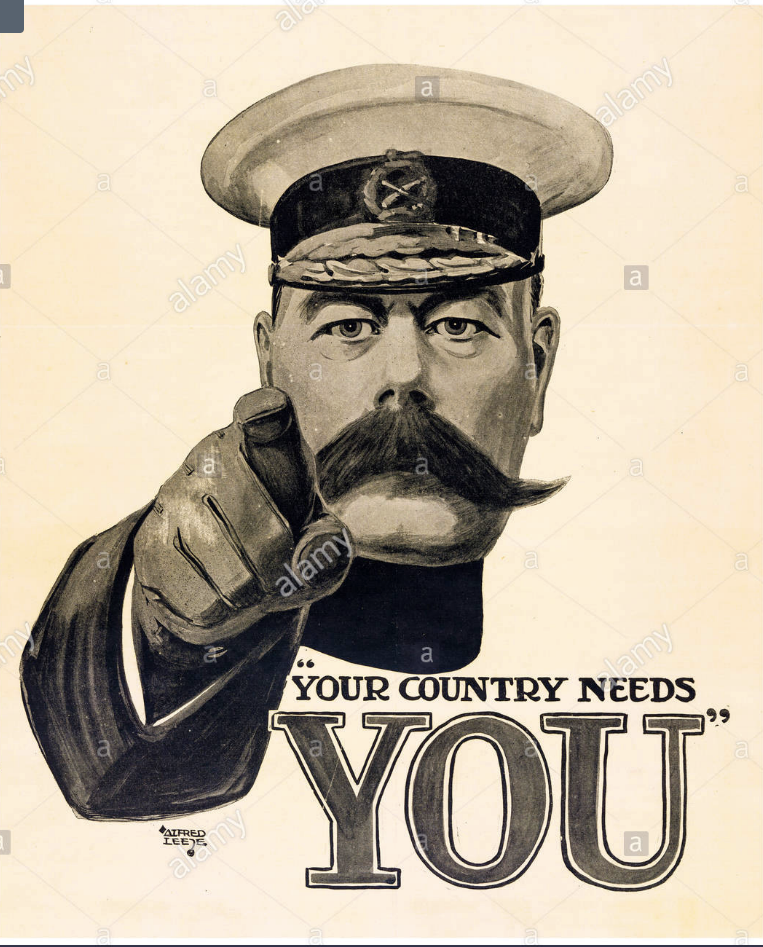
John Bull, “who’s absent” “is it you?”
The cartoon isn’t explicitly saying join the war which plays on the guilt of the citizens that if they are absent they should join.
Conveys more of a reality of the war, igniting sympathy or empathy for the soldiers who are present and fighting from the citizens
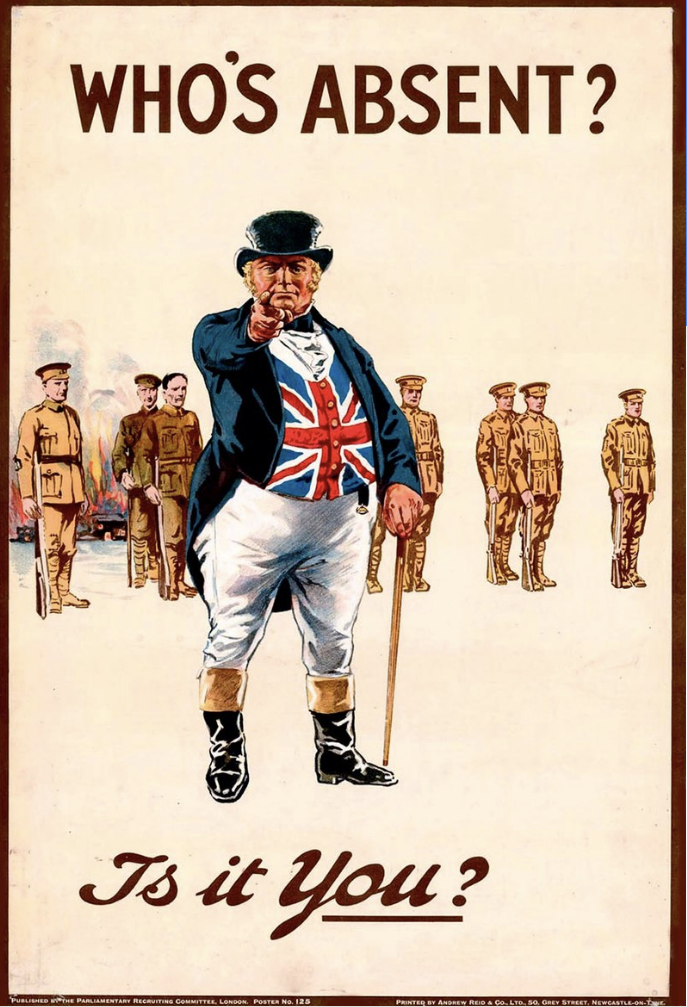
“Step into your place”
The British are united together despite social class, The unity of Great Britain
No matter who you are you must carry out your duty and responsibility
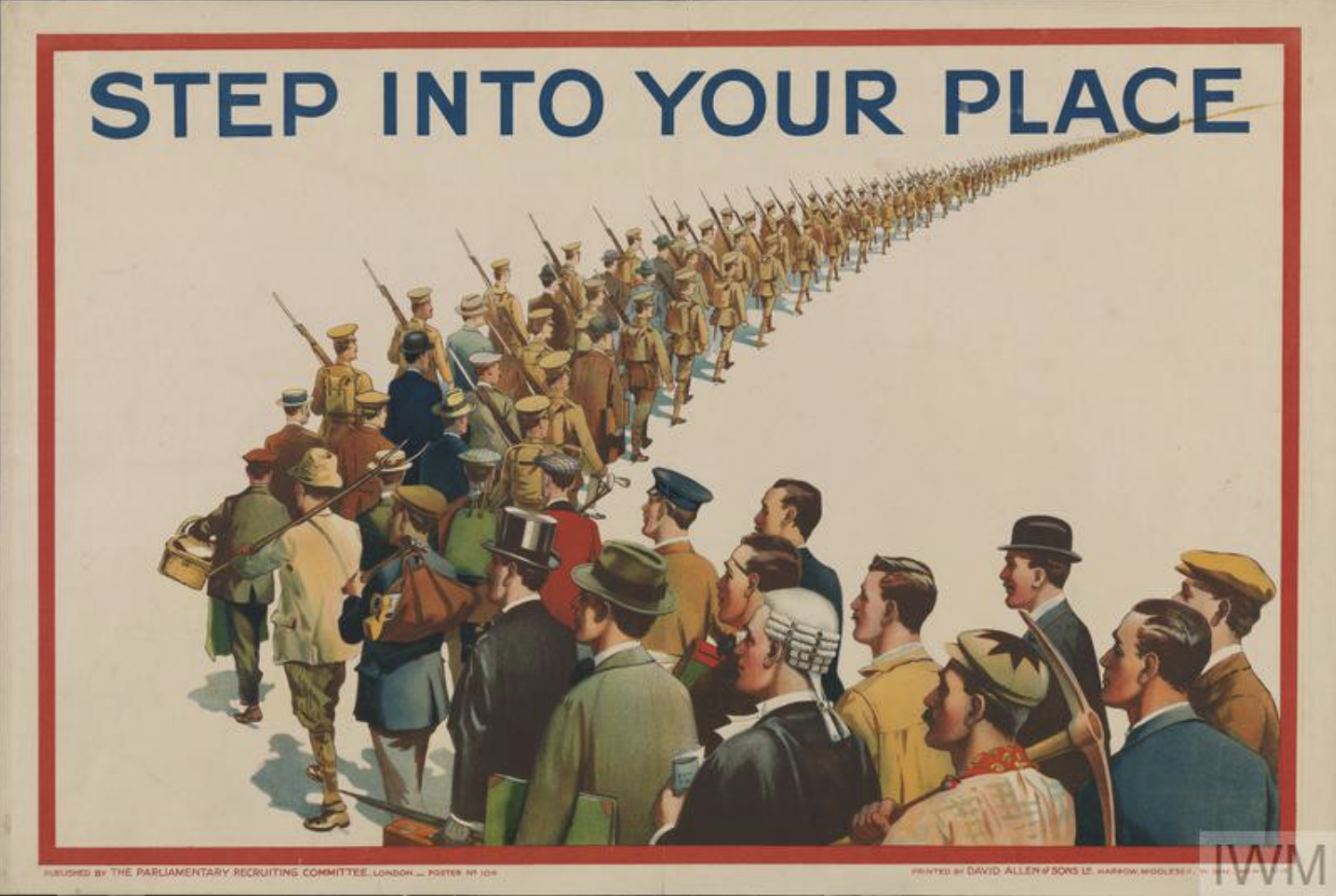
“Women of Britain say go”
Men should carry out their responsibilities and duties to protect the women and children
Women want and encourage the young men to go to war
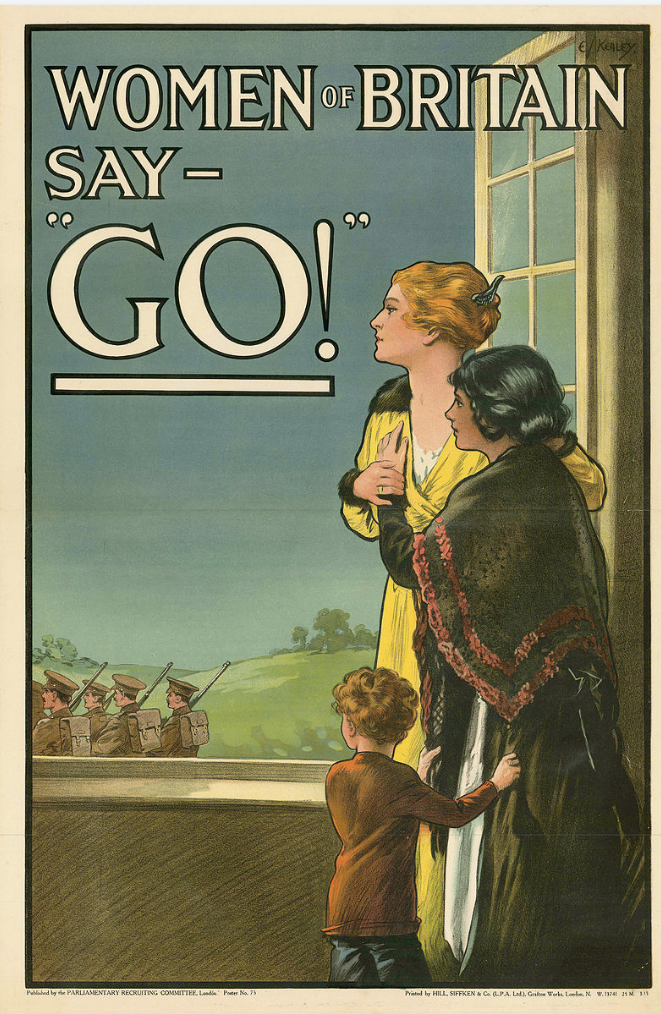
“Daddy what did you do in the great war”
Shames men who don’t go to war for not fulfilling their duty to their country, makes them feel ashamed, plays on their conscience that the father should be the role model for the children
This father isn’t a role model for his children because he didn’t go to war and the premonition that his son will follow in his footsteps and not do his duty
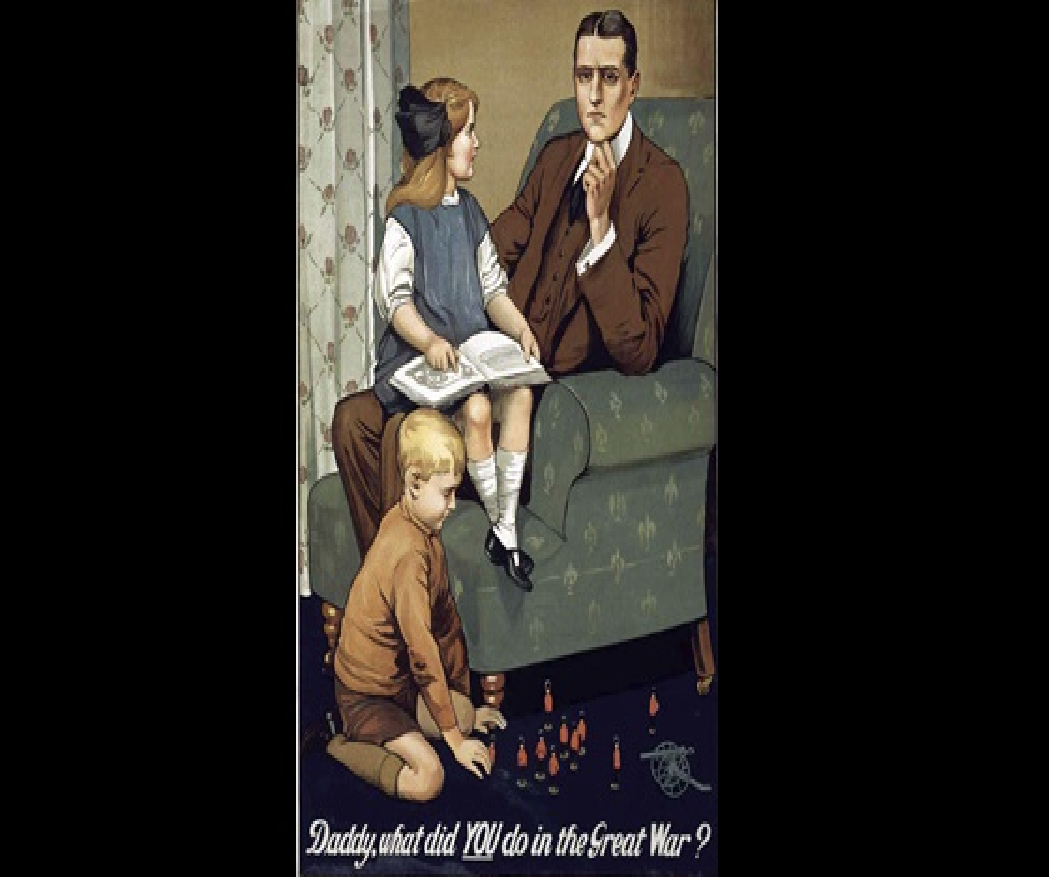
“Back up the fighting forces”
Men should go to war and they have choices of where they can enlist such as the Navy, Marines, or Army
You will be honored and praised, looked up to, the men are confident which comes from the experience of war which makes them a man
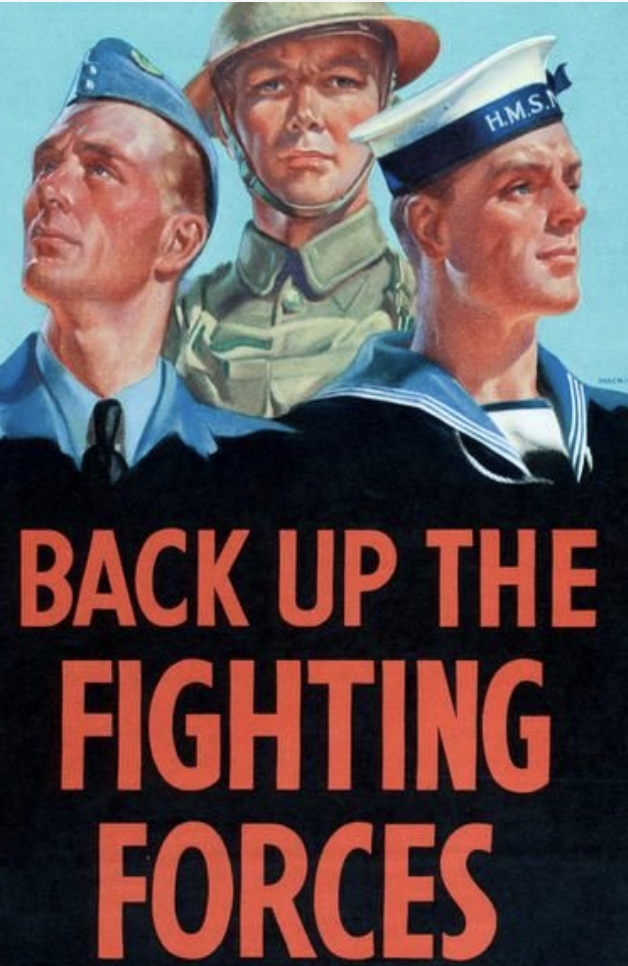
“Men of Britain” “Will you stand for this”
It plays on the civilians’ nationalism for their country, seeing its destruction ignites their sense of duty to protect their country
Seeing the hurt children and women guilts them into action, shaming them for possibly being at fault for the destruction and death because they aren’t present in the war
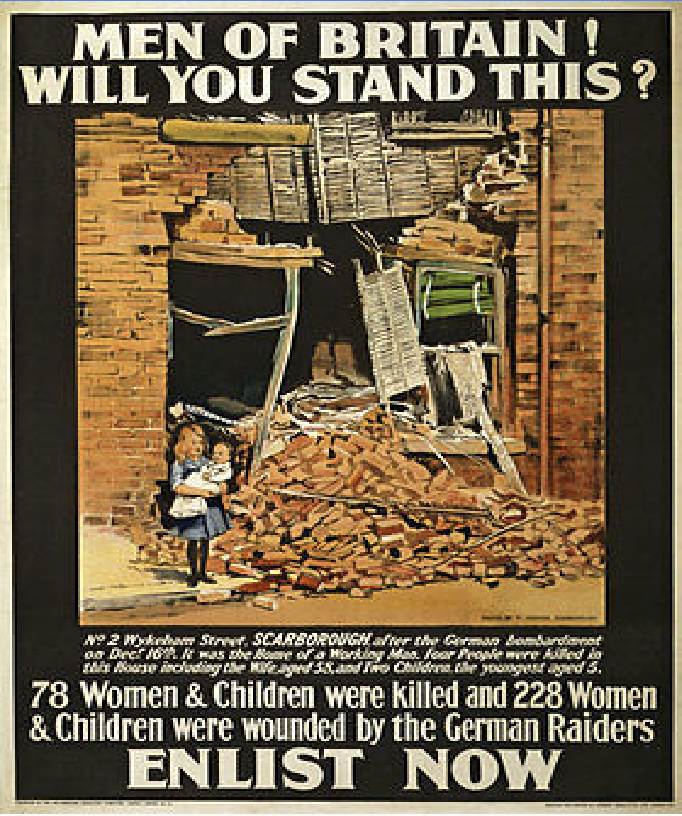
Source Rats message
The rats were a serious problems
Especially when the soldiers couldn’t leave food around unless they wanted to be swarmed by rats and they had to be careful of rat bites which led to serious health problems

Source Trenches “hell” message
No protection from the weather and climate
These horrible conditions inflict serious health problems

Source food rationing message
It ensured a regular and sufficient food supply
Improved many of the health conditions of the civilians
Prevented famine

Source home/war front message
Home front: Starvation, children were dying
War Front: Starvation and self-harm of the soldiers to go home
